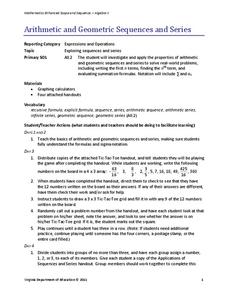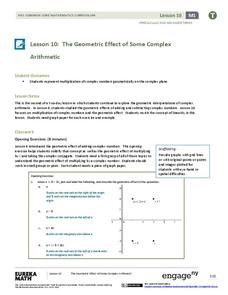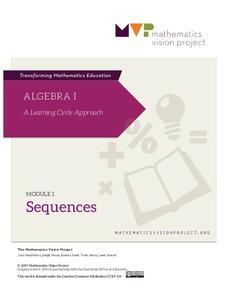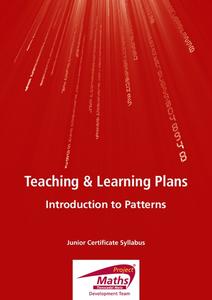CK-12 Foundation
Arithmetic Series Sums: Adding Arithmetic Sums
Sum up the shortcuts. The interactive allows pupils to discover a shortcut in finding a partial sum of an arithmetic series. Learners use the shortcut to find other sums and to verify the process.
Flipped Math
Series
Add it all together. Pupils learn how Gauss was able to add the numbers from 1 to 100 so quickly and arrive at a formula to find the sum of a given number of terms of an arithmetic series. Scholars learn the formula to find the sum for a...
CK-12 Foundation
Sums of Finite Arithmetic Series: Triangular Numbers
Using a slider, scholars build triangular numbers and their associated rectangles and use the geometric display to find the pattern to determine the next triangular number. They then relate that number to the area of the rectangle to...
Curated OER
Series Review Sheet
Save an infinite amount of time and enjoy this pre-made series formula guide. Arithmetic and geometric formulas are all included as well as Pascal's Triangle and examples of how the Binomial Theorem expands.
Virginia Department of Education
Arithmetic and Geometric Sequences and Series
Examine the importance of sequence and series through contextual situations. Here, learners partake in a five-day unit that begins with the basics of arithmetic and geometric sequences and series. As it progresses, pupils apply the...
EngageNY
The Geometric Effect of Some Complex Arithmetic 2
The 10th lesson in a series of 32, continues with the geometry of arithmetic of complex numbers focusing on multiplication. Class members find the effects of multiplying a complex number by a real number, an imaginary number, and another...
EngageNY
The Geometric Effect of Some Complex Arithmetic 1
Translating complex numbers is as simple as adding 1, 2, 3. In the ninth lesson in a 32-part series, the class takes a deeper look at the geometric effect of adding and subtracting complex numbers. The resource leads pupils into what it...
EngageNY
Networks and Matrix Arithmetic
Doubling a network or combining two networks is quick and easy when utilizing matrices. Learners continue the network example in the second lesson of this series. They practice adding, subtracting, and multiplying matrices by a scalar...
Santa Barbara City College
How to Make a Multiplication Table
Teach children how to make a multiplication table, and they'll be multiplying for life. Following this series of steps, young mathematicians learn to use patterns and the relationships between numbers to create...
Mathematics Vision Project
Module 1: Sequences
Take steps into sequences. An 11-lesson unit builds upon pupils' previous understanding of writing expressions to develop the idea of sequences. The resource explores both arithmetic and geometric sequences using recursive and explicit...
Mathematics Vision Project
Module 1: Sequences
Sequences are all about recognizing patterns. A module of 11 lessons builds pupils' understanding of sequences through pattern analysis. The practice connects the analysis to linear and exponential equations. This is the first module in...
Mathed Up!
Sequences
Explicitly talk to the class about sequences. A segment of a review series for the General Certificate of Secondary Education math assessment provides a review of arithmetic sequences. Pupils watch a video showing how to find terms given...
Rice University
Intermediate Algebra
Algebra concepts are all wrapped up in one nice bow. The resource combines all the concepts typically found in Algebra I and Algebra II courses in one eBook. The topics covered begin with solving linear equations and move to linear...
Mathematics Vision Project
Features of Functions
What are some basic features of functions? By looking at functions in graphs, tables, and equations, pupils compare them and find similarities and differences in general features. They use attributes such as intervals of...
EngageNY
Chance Experiments with Outcomes That Are Not Equally Likely
The fifth portion of the 25-part series introduces probabilities calculated from outcomes that are not equally likely. Class members use tables to calculate probabilities of events, add outcome's probabilities, and find...
EngageNY
Surface Area II
The class makes the connection between finding the area of a right prism and a right pyramid in the 23rd installment in a series of 28. The pupils find the surface area of figures created by stacked cubes and prisms with cutouts.
EngageNY
Integer Sequences—Should You Believe in Patterns?
Help your class discover possible patterns in a sequence of numbers and then write an equation with a lesson plan that covers sequence notation and function notation. Graphs are used to represent the number patterns.
24x7 Digital
TeachMe: 1st Grade
Let your eager learners practice their basic arithmetic and spelling skills with this fun interactive resource! For any primary grade teacher with access to an Apple mobile device, this is a must-have application.
EngageNY
Mid-Module Assessment Task: Grade 6 Math Module 2
Make sure scholars know all about fractions and decimals — not just a fraction of the information. The 12th installment of a 21-part series is a mid-module assessment. Learners solve problems in the context of a birthday party and a...
EngageNY
End-of-Module Assessment Task: Grade 6 Math Module 2
Give learners a chance to shine. The last installment of a 21-part series is an end-of-module assessment. Scholars show their understanding of operations with decimals and division of fractions by solving problems in the context of a...
Curated OER
Adding & Subtracting (Combining) Integers
Maintain a positive atmosphere in your math class with this fun lesson on adding and subtracting integers. After first explaining the rules for combining positive and negative numbers, this resource uses a comic strip...
Project Maths
Introduction to Patterns
The world is full of patterns. Help learners quantify those patterns with mathematical representations. The first Algebra lesson in a compilation of four uses a series of activities to build the concept of patterns using multiple...
EngageNY
Putting It All Together
Shuffle 'em up and deal! Learners practice operations with polynomials using cards they pass around the room. The activity works with pairs or individuals, so it offers great flexibility. This is the fifth installment in a series of 42...
EngageNY
Numbers in Exponential Form Raised to a Power
Develop an understanding of the properties of exponents through this series of activities. This third lesson of 15 explores the patterns associated with the power property. Scholars expand the powers before applying the property.























